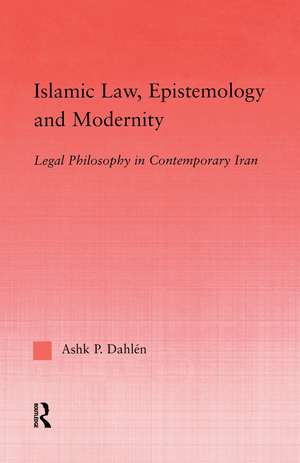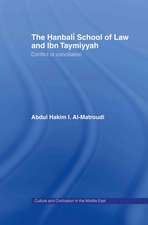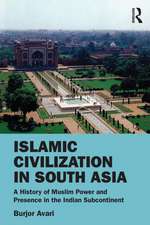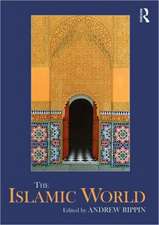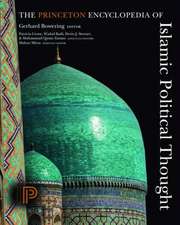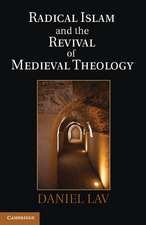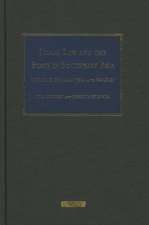Islamic Law, Epistemology and Modernity: Legal Philosophy in Contemporary Iran: Middle East Studies: History, Politics & Law
Autor Ashk Dahlenen Limba Engleză Paperback – 23 apr 2015
| Toate formatele și edițiile | Preț | Express |
|---|---|---|
| Paperback (1) | 441.97 lei 6-8 săpt. | |
| Taylor & Francis – 23 apr 2015 | 441.97 lei 6-8 săpt. | |
| Hardback (1) | 1180.94 lei 6-8 săpt. | |
| Taylor & Francis – 28 feb 2003 | 1180.94 lei 6-8 săpt. |
Preț: 441.97 lei
Nou
Puncte Express: 663
Preț estimativ în valută:
84.57€ • 88.48$ • 70.25£
84.57€ • 88.48$ • 70.25£
Carte tipărită la comandă
Livrare economică 03-17 aprilie
Preluare comenzi: 021 569.72.76
Specificații
ISBN-13: 9780415762403
ISBN-10: 0415762405
Pagini: 424
Dimensiuni: 152 x 229 x 25 mm
Greutate: 0.59 kg
Ediția:1
Editura: Taylor & Francis
Colecția Routledge
Seria Middle East Studies: History, Politics & Law
Locul publicării:Oxford, United Kingdom
ISBN-10: 0415762405
Pagini: 424
Dimensiuni: 152 x 229 x 25 mm
Greutate: 0.59 kg
Ediția:1
Editura: Taylor & Francis
Colecția Routledge
Seria Middle East Studies: History, Politics & Law
Locul publicării:Oxford, United Kingdom
Cuprins
Preface List of transliteration 1. Introduction A. Purpose and nature of the study B. Theory and methodology C. Previous research D. Introductionary remarks on analytical concepts E. Modernity , postmodernism and secularism 2. The Nature of Islamic law A. An Islamic legal system? Law, jurisprudence and ethics B. Law and spirituality: Shi'i esoterism 3. Categories of traditional Islamic epistemology A. Knowledge and science B. The 'historical-empirical' epistemic scheme C. The 'theological', 'philosophical' and 'mystical' epistemic schemes D. The 'juristic-rational' epistemic scheme 4. Shi'i legal dogmatics A.Usul al-fiqh (legal theory) B. The constant sources of law: The Qur'an, sunnat and imja (consensus) C. The non-constant source of law: aql (reason) D. Ijtihad (independent reasoning) and taqlid (emulation) E. Hauzah-yi ilmiyah ('precint of knowledge') F. Hermeneutical principles G. Interpretative pluralism and ikhtilaf (divergence) 5. Islamic traditionalism and Islamice modernism A. An Introduction to Islamic traditionalism B. The Islamic traditionalist position of Abdullah Jawadi-Amuli C. An Introduction to Islamic modernism D. The Islamic modernist position of Muhammad Mujtahid-Shabistari 6. Surush on the nature of Islamic law A. The Biography of Abd al-Karim Surush B. Style of communication C. Philosophical foundation: Critical realism D. Modernity and the West E. Religion F. Jurisprudence G. Ijtihad H. Hauzah 7. Surush's theory of contraction and expansion of religious knowledge A. Its principal objectives B. History: The Stage of natural man C. Critical rationality: Self-determining and liberated D. Science: Falsification and corroboration E. Religous epistemology: Divine absolute or provisional conjecture? F. Epistemological ambiguities: A priori and a posteriori G. Epistemic relativism or epistemological relativism H. Hermeneutics: There is nothing beyond the text I. Divergent interpretations: The Problem of truth and probability Conclusions Bibliography Tables: I. Contemporary positions on Islamic law II. The textual corpus of Abd al-Karim Surush
